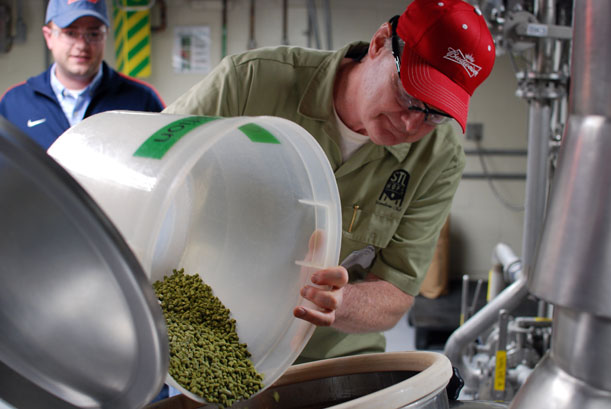MONDAY BEER LINKS, MUSING 12.15.14
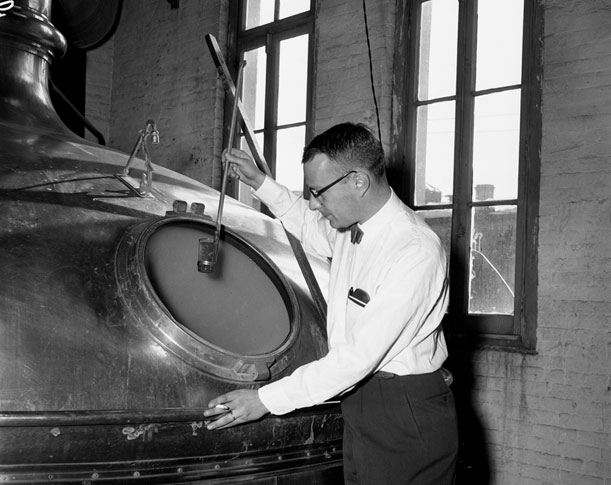
A ‘good mixer.’
The State Journal-Register in Springfield, Illinois, occasionally hauls out photos from its archives. This one is from December 1953. It shows Ed Reisch, the fourth generation of his family to run Reisch Brewing, at a brew kettle. The brewery closed in 1966 and Reisch went to work at Pabst Brewing in Milwaukee. His son, George (his tweet led me to this photo), became a corporate brewmaster at Anheuser-Busch (now AB InBev). His grandson, Patrick, is a brewer at Goose Island Beer Co. in Chicago. I’m pretty sure Reisch was not manning the kettles that day. The shirt and bow-tie are one giveaway; the cigarette in his left hand another. And on a historic note, it seems that Reisch Brewing still had oak fermentation vessels in the 1950s. [Via The State Journal-Register]
Beers from my past-Pt 1: The Anheuser-Busch American Originals.
Mitch Steele — you know, the guy who once brewed at Anheuser-Busch, now oversees brewing at Stone, and who wrote a book about IPA — digs into his garage and his memory to start a series about when he worked in new products at A-B (mid- to late-90s). He plans to include details about Faust, which has been getting new attention recently, in the next one. [Via The Hop Tripper]
Black-Market Brews: Inside the Super-Secret World of Beer Muling.
Who needs lions and tiger and bears when you’ve got whales and mules, oh my? Just when you thought the New Beer World couldn’t get any stranger there’s a story like this. It would have broken my spirit to spend any time reading discussions that followed at Rate Beer and Beer Advocate, but I particularly like this comment on the STL Hops forum: “I feel that actual mules would think that this term is derogatory to them and possibly to farmers and whatnot who actually use mules.” [Via First We Feast]
The King has left the building.
h/T to Roger Baylor for pointing to this. He put it better than I can (not the first time I’ve written those words about his blog): “Writing well is very, very hard, and the best way to approach it is to tell the truth and write what you know. Sometimes, what you know is awfully hard to write with honesty.” [Via Louisville Beer]
Big Beer: Is Consolidation Limiting Your Drink Selection?
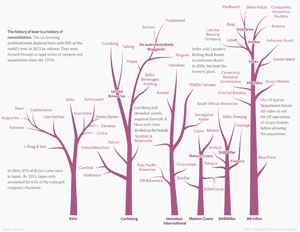 Skip to the end for the dire warning: “If the consolidation trend continues to absorb more and more of the world’s brewing market, we could see the same product sold under different brand names in an attempt to give consumers the illusion of choice.” Obviously not happening in our small world. But the real reason I’m pointing to this is it uses a great graphic first posted at Quartz at the beginning of October and until Saturday overlooked by me. Of course, it is already out of date. There’s a Blue Point branch on the AB InBev tree but no 10-Barrel. [Via Business CheatSheet]
Skip to the end for the dire warning: “If the consolidation trend continues to absorb more and more of the world’s brewing market, we could see the same product sold under different brand names in an attempt to give consumers the illusion of choice.” Obviously not happening in our small world. But the real reason I’m pointing to this is it uses a great graphic first posted at Quartz at the beginning of October and until Saturday overlooked by me. Of course, it is already out of date. There’s a Blue Point branch on the AB InBev tree but no 10-Barrel. [Via Business CheatSheet]
Fear Beer? Sometimes the Best Wine is a Beer (or a Cider).
Mike Veseth writes, “I spoke about the trends I have observed traveling the world in the past year and one of them is the rise of craft beer and cider and their growing incursion into the wine space. I see it everywhere and the people I meet are often surprised that it is a widespread phenomenon. I thought it was just something that’s happening here is a common response.” Read that last sentence again. [Via The Wine Economist]
Urban spelunking: Leinenkugel’s 10th Street Brewery.
A reminder that an “ultramodern” and “highly automated” brewery meant something different in 1985, when G. Heileman Brewing built this facility. Today? “At best I would call 10th Street a partially automated brewhouse, some of the temperature controls of the mash and some of the brews vessel to vessel movements are automated – with the brewer pressing a button to start and stop the processes – but that would be it.” [Via OnMilwaukee.com]
New brewery in Thibodaux to offer King Cake Ale.
Cinnamon, vanilla and lactose aren’t ingredients that constitute something specifically local to south Louisiana, so it’s probably a stretch to call King Cake Ale a place-based beer, but it’s probably worth a trip to Thibodaux just to make sure. [Via WWLTV.com]
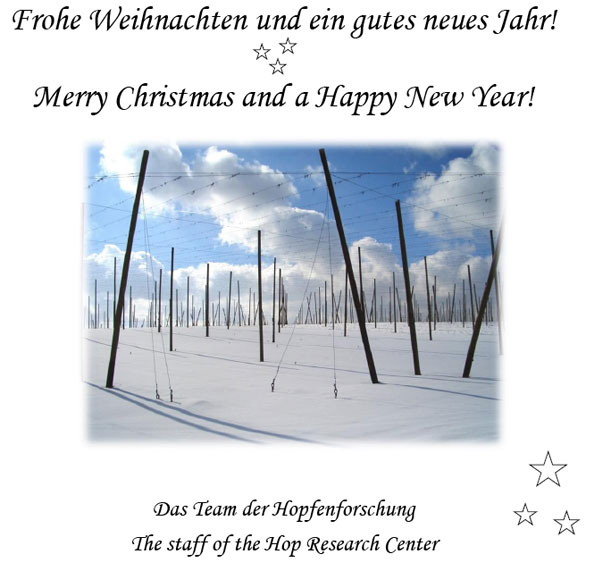
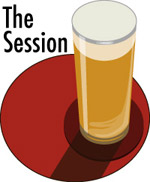 The topic for The Session #94 today is:
The topic for The Session #94 today is: 